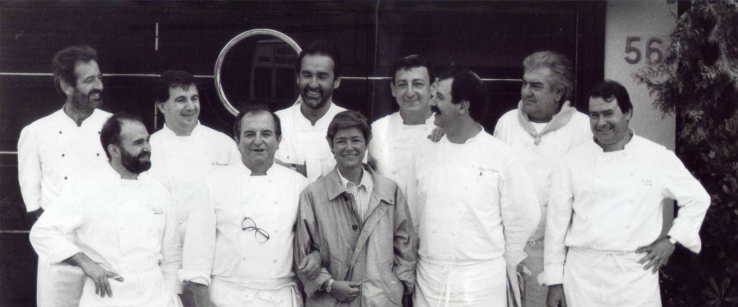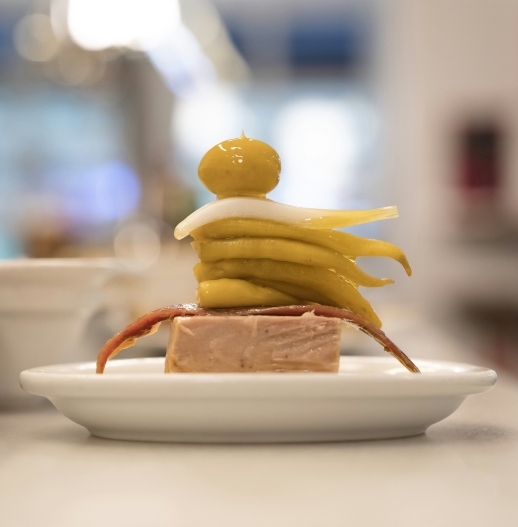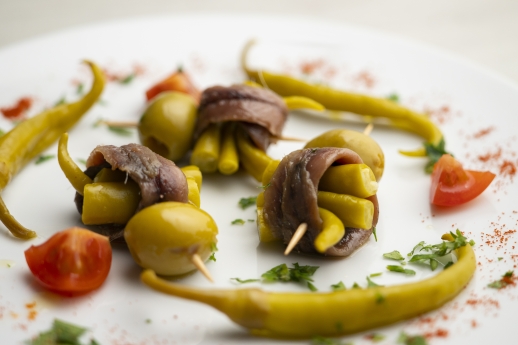The city of San Sebastián, in Basque Country, is a small seaside town with a quiet beach promenade and picturesque old town. It may come as a surprise, then, that this dot on the map regularly ties the city of Kyoto for most Michelin stars per person. This corner of Basque Country is where Spain’s culinary revolution began, at the hands of a group of young Basque chefs in the 1970s. Thanks to the group of chefs that founded New Basque Cuisine (Nueva Cocina Vasca), it has become one of the most globally renowned cuisines on the world stage, praised for its quality, traditions, and haute execution. New Basque Cuisine went on to inspire chefs across Spain, resulting in Spain claiming its place on the prize podium of the world culinary stage right next to its neighbor France. But why, exactly, did it happen when and where it did?
From Tradition to Innovation: How Basque Values Created a Culinary Revolution
02 May 2025
It was no accident that the culinary revolution started on Basque terroir. Read on to find out how the unique value system of the Basque culture formed the foundation of one of the world’s most impactful culinary movements.
The Birth of New Basque Cuisine
During the mid-1970s, Spain was undergoing a profound transformation. The death of dictator Francisco Franco in 1975 marked the beginning of the country’s transition to democracy, as well as a period of cultural resurgence in which national identities, including Basque heritage, sought new ways to express themselves—including through food.
Chefs Juan Mari Arzak and Pedro Subijana spent an intensive time at Paul Bocuse’s restaurant in Lyon, where the principles of Nouvelle Cuisine—a focus on market-driven, seasonal ingredients and simplicity—deeply influenced them. Upon their return to Basque Country, they formed a group of about a dozen chefs and put on a series rotating experimental dinners, held in different restaurants, that served as a testing ground for new techniques, ingredient pairings, and creative interpretations of Basque dishes. Over the next two years, this process evolved into an essential culinary laboratory, fostering discussion, feedback, and refinement.
This all culminated in a manifesto outlining their vision, summed up in the following objective:
"Placing Basque cuisine among the best in the world as our main goal, a difficult one, since we know that the Chinese and French cuisines are recognized as the world’s best. And, without arrogance, we think that the Basque cuisine can reach the same goals, thanks to its quality and its tradition."
They unearthed forgotten recipes, refined traditional dishes with authenticity in mind, and pushed the boundaries of innovation.
This patriotic culinary movement resonated deeply across the Basque Country, spreading through every province and providing chefs with a shared mission: the birth of New Basque Cuisine. They unearthed forgotten recipes, refined traditional dishes with authenticity in mind, and pushed the boundaries of innovation. Their influence shaped an entire generation of chefs, all of whom trained under the pioneers of this movement and resulted in the creation of new Basque dishes using local ingredients in innovative ways.
The ripple effect of their work extended far beyond the Basque borders, inspiring a nationwide culinary transformation that ultimately led to Ferran Adrià’s groundbreaking work at El Bulli and the more general rise of Spain’s culinary scene. On a local level, it cemented the Basque culinary identity as we know it today—one defined by revered chefs, Michelin-starred restaurants, and the dynamic, changing world of pintxo bars.
Much of today’s Basque society is a modern flowering from very ancient roots, roots that include the value of the society over the individual, a sense of collaboration, and a respect for heritage.
The Raw Material: Basque Cultural Values
If you look closely at the values behind New Basque Cuisine, they begin to look suspiciously similar to the values of Basque culture in general; values that have guided the Basque people for hundreds of years. Much of today’s Basque society is a modern flowering from very ancient roots, roots that include the value of the society over the individual, a sense of collaboration, and a respect for heritage. And when watered with an entrepreneurial spirit, they have gone on to bear some serious (and seriously delicious) fruits.

-
Collaboration over competition
Cooperation and collaboration are a foundation of the Basque societal structure. It even has a Basque name: auzolan is the traditional system of communal work where community members collaborate on projects for collective benefits. Sound familiar? The gathering of Basque chefs to found a new culinary movement was a direct mirroring of this tradition.
While it may sound natural, their French contemporaries were known for closely guarding their techniques, recipes, and methods as valuable intellectual property. A traditional French culinary guild system only filtered down knowledge within a strict, closed hierarchical structure. Chefs often spent years working their way up through rigorous apprenticeship systems, and signature techniques were considered proprietary assets of individual restaurants or chefs. The willingness of Basque chefs to collaborate helped this movement to gain traction quickly, and it is obviously rooted in the Basque auzolan tradition of community cooperation.
-
Respect for tradition while embracing innovation
The founding chefs of the Basque culinary movement held up traditional recipes and local produce as their gastronomic guiding light. By remaining connected to their roots, they set a framework in which to work out a modern version of Basque cuisine. Traditional ingredients get a reimagining using innovative techniques and preparations. Valuing cultural heritage and using it as framework for modern times is common in 20th century Basque culture.
One example can be found in the Mondragon cooperative system, founded in 1956. This distinctive approach, where workers are co-owners with shared decision-making power, is the modern adaptation of auzolan, yet quite innovative in its execution. The ikastola, or the Basque school system, is another example of a social institution that maintained cultural essence while implementing an advanced and progressive pedagogy.
-
Community responsibility
In many cultures, restaurants are first and foremost businesses—the bottom line is everpresent. In Basque culture and the New Basque Cuisine movement, however, chefs saw themselves as cultural ambassadors. A sense of responsibility to their heritage was a driving force. A commitment to local producers and ingredients reflects the Basque value of supporting the broader community, seen as well in the Mondragon cooperatives. This sense of community responsibility rarely takes front and center in a restaurant in the way it has with this movement.

Basque Cultural Values as a Secret Ingredient
These values have undeniably contributed directly to the success of Basque cuisine and its evolution to international acclaim, best restaurant lists, and the opening of world-class food research centers like the Basque Culinary Center. The fact that these values have lasted throughout very different periods in history, from industralization to civil war, suggests that they form a fundamental part of the Basque character and cultural identity. The Nueva Cocina Vasca represents a contemporary manifestation of ancient Basque principles.
The founders of the New Basque Cuisine movement finished their manifesto with the phrase: “We are conscious of the effort it will take, but we think we this is our duty.” The sense of duty for a higher purpose, the perseverance in the face of immense pressure, and the calling of a higher purpose are foundational to the Basque value system—and they were fundamental in the creation of this influential culinary movement. The link between Basque cuisine and cultural identity is undeniable and, perhaps, the key to this movement’s lasting success.





